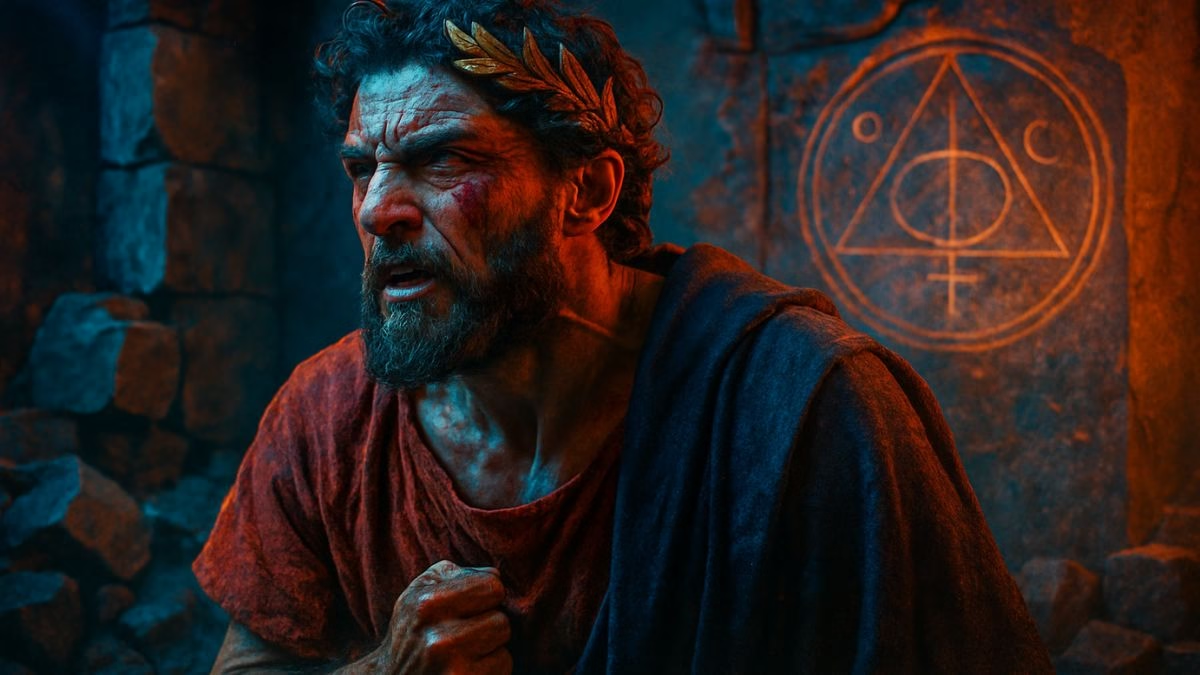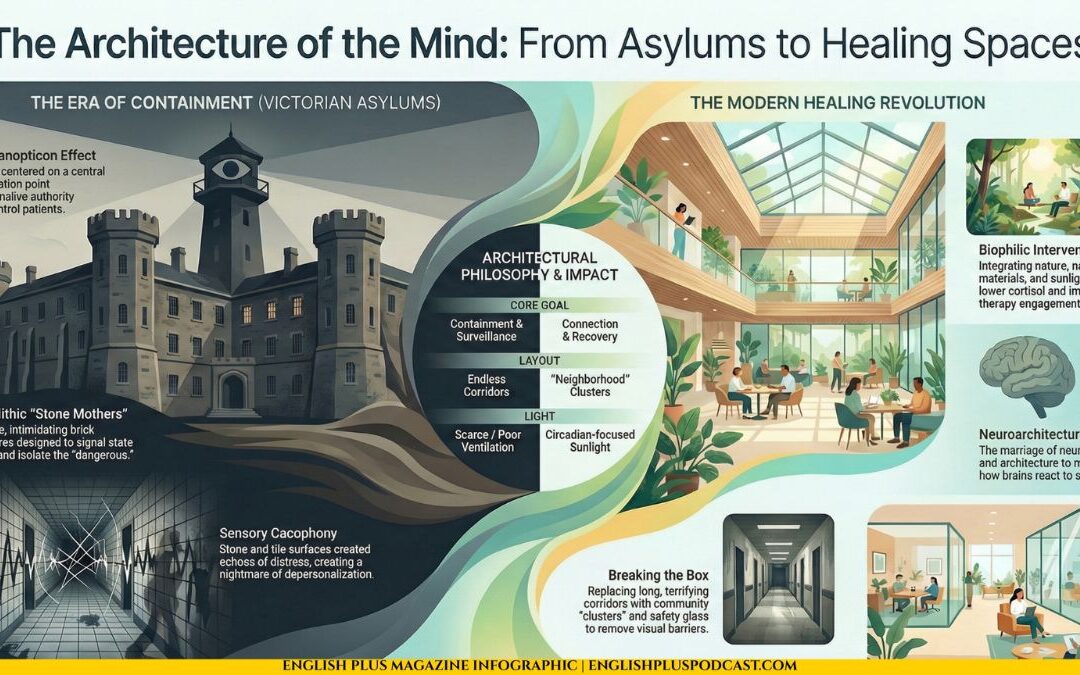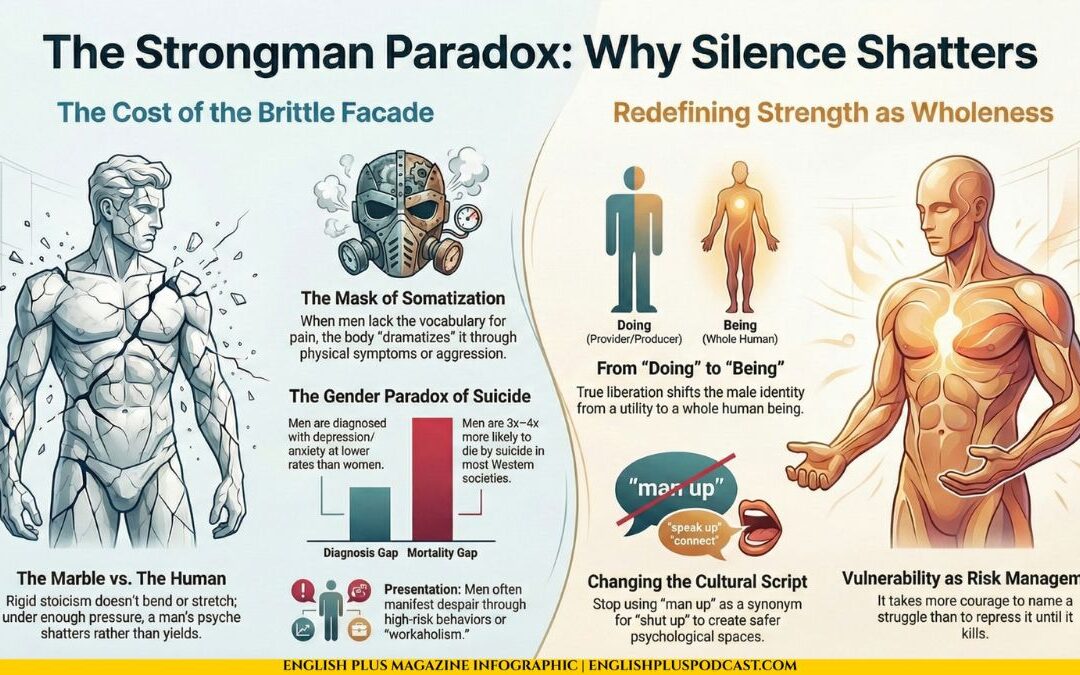Introduction
I want to start today with a spoiler alert. Now, it feels a little absurd to offer a spoiler alert for a story that’s been a bestseller for roughly 2,500 years, but the power of this particular story lies in its devastating, methodical, and inevitable reveals. It is, in essence, the world’s first and perhaps greatest psychological thriller, structured as a cold case investigation where the lead detective, a man of brilliant intellect and unimpeachable character, works tirelessly to find a culprit, only to discover with dawning horror that the man he is hunting is himself.
The story is Oedipus Rex, or Oedipus the King, a masterpiece of Athenian tragedy written by the great playwright Sophocles around 429 BC. It is a cornerstone of Western literature, a work so profound that Aristotle considered it the perfect model of tragedy, and Sigmund Freud borrowed its name to describe one of the most fundamental concepts of psychoanalysis.
But don’t let its age or its academic prestige fool you. This is no dusty museum piece. This is a raw, brutal, and fast-paced story of a man who runs headfirst into a destiny he has spent his entire life trying to escape. It’s a play that grabs you by the collar from the first scene and doesn’t let go until its soul-crushing, unforgettable conclusion.
So, what are the burning questions we’re going to investigate today as we put this ancient case under the microscope?
First, we will lay out the facts of the case. We’ll walk through the plot of this extraordinary play, not just as a summary, but as the intricate, suspense-filled procedural that it is. How does Sophocles use masterful pacing and suspense to turn a story whose ending the original audience already knew into a nail-biting thriller?
Next, we’ll ask the big philosophical question that beats at the heart of the play: Is this a story about the inescapable cruelty of fate, or is it about the danger of human pride and ignorance? Was Oedipus merely a puppet of the gods, or did his own actions, his own character, seal his doom? This is the timeless debate of fate versus free will.
Then, we’ll explore the brilliant literary techniques Sophocles employs. We’ll delve into the concepts of dramatic irony—how the audience knowing more than the characters creates unbearable tension—and the idea of blindness versus sight, both literal and metaphorical.
And finally, we’ll ask why this ancient, horrifying story of patricide and incest has endured. What is the so-called “Oedipus Complex”? And what can a 2,500-year-old Greek tragedy possibly teach us about the modern human condition, about our own struggles with truth, denial, and the search for identity?
A word of warning, as is our custom: this episode is an entry point, a key to unlock the door to a very complex and profound work of art. To truly grasp the genius of Sophocles, the intricate poetry, and the philosophical depth, you must eventually go to the source. Read the play. Watch a performance. Grapple with it yourself. True knowledge is not a destination arrived at by shortcuts, but a landscape explored through patient and personal investigation.
So, prepare yourselves. We are about to descend into the dark, brilliant, and tragic world of Oedipus the King.
Athenian Tragedy: Sophocles’ Oedipus Rex
Before we dive into the specifics of the plot, we need to set the stage, literally. When an ancient Athenian audience gathered in the Theater of Dionysus to watch Oedipus Rex, it wasn’t like us going to the movies for a bit of escapism. This was a major civic and religious event, part of a festival honoring Dionysus, the god of wine, revelry, and theater. The stories, often drawn from shared myths, weren’t meant to be simple entertainment; they were meant to be a communal exploration of the biggest questions of their time: about justice, about the relationship between gods and mortals, about the nature of a good society, and the flaws of human character.
The play opens in the city of Thebes, which is in the grips of a terrible plague. The crops are failing, the livestock are dying, and the people are suffering. They turn to their king, Oedipus, for help. And why wouldn’t they? Oedipus is a hero. He’s not the hereditary king; he won the throne on pure merit. He arrived in Thebes as a stranger and saved the city from a monstrous creature, the Sphinx, by solving her famously difficult riddle. He is brilliant, decisive, and deeply beloved by his people. He is the very model of a successful ruler.
Oedipus, eager to save his city, has already sent his brother-in-law, Creon, to the Oracle at Delphi to ask the god Apollo for guidance. Creon returns with a divine message: the plague is a punishment because the murderer of the previous king, Laius, is living unpunished in Thebes. To end the plague, the city must find this killer and either execute or exile him.
This is where the detective story begins. Oedipus, with his characteristic confidence and sense of duty, launches a full-blown investigation. He pronounces a solemn curse upon the killer, wherever he may be, and upon anyone who harbors him. He vows to hunt this person down as if he were his own father. And right there, Sophocles masterfully deploys what is perhaps the most important literary device in the entire play: dramatic irony.
Dramatic irony is the gap between what a character knows and what the audience knows. The original Athenian audience knew the myth of Oedipus inside and out. They knew from the moment Oedipus pronounced that curse that he was, in fact, cursing himself. Every confident vow he makes, every step he takes to find the killer, is, for the audience, a step closer to his own self-destruction. It’s excruciating to watch. It’s the same feeling you get when you’re watching a horror movie and you shout at the screen, “Don’t go in there!” The character can’t hear you, and their ignorance leads them to their doom. Sophocles is the absolute master of this technique.
Oedipus summons the blind prophet, Tiresias, to help. Tiresias knows the truth but, out of pity for Oedipus, refuses to speak. Oedipus, whose defining characteristic is his sharp intellect, cannot stand being denied information. His confidence boils over into anger and suspicion. He accuses Tiresias of being part of the plot to murder Laius. This is a classic example of hubris—a Greek term for excessive pride or self-confidence that leads to a character’s downfall. Oedipus’s pride in his own intelligence makes him blind to the wisdom of the prophet.
Goaded by the accusations, Tiresias finally snaps and tells Oedipus the truth outright: “You are the curse, the corruption of the land… You are the murderer you seek.”
But the truth is so monstrous, so far outside the realm of possibility, that Oedipus can’t process it. He thinks it’s a political conspiracy, a lie concocted by Creon and Tiresias to overthrow him. Here we see another central theme: the paradox of blindness and sight. Tiresias is literally blind, yet he can “see” the horrific truth. Oedipus has perfect sight, yet he is completely “blind” to the reality of his situation.
The investigation continues, and each piece of new information, intended to exonerate Oedipus, only tightens the noose. His wife, Jocasta, trying to comfort him and prove that prophecies are meaningless, tells him the story of her former husband, King Laius. She says a prophecy once claimed Laius would be killed by his own son. To prevent this, they pierced their infant son’s ankles and had a servant leave him to die on a mountainside. As for Laius, she says, he was killed years later by robbers at a place where three roads meet.
Instead of comforting Oedipus, this story plants the first seed of real terror in his mind. “A place where three roads meet?” he asks, his voice trembling. He remembers killing a man who matched Laius’s description at just such a crossroads on his journey to Thebes. He is starting to suspect he might be Laius’s killer. But the other part of the prophecy—that he would marry his mother—is still unthinkable.
The tension ratchets up. A messenger arrives from Corinth, Oedipus’s childhood home, with what seems to be good news: his “father,” King Polybus, has died of old age. Oedipus is overjoyed. This seems to prove the prophecy he received as a young man—that he would kill his father and marry his mother—is false. But the messenger, wanting to fully relieve Oedipus’s fears, reveals another piece of the puzzle: Polybus and his wife were not his biological parents. The messenger himself, as a young shepherd, was given an infant with pierced ankles by a servant of King Laius and gave that baby to the childless king of Corinth.
This is the moment of anagnorisis—or critical discovery—for Jocasta. She puts the pieces together. She knows. She begs Oedipus to stop the investigation. “My poor boy! I hope you never find out who you are!” she cries, before running into the palace.
But Oedipus, driven by his relentless need for the truth—his greatest virtue and his fatal flaw—presses on. He is on the verge of knowing everything, and he refuses to turn back. He summons the final witness, the old shepherd who was supposed to have left him to die. The shepherd, under threat of torture, finally reveals the last, horrifying piece of the puzzle: the baby he was given was the son of Laius and Jocasta.
And there it is. The truth, in all its horror. The prophecy has been fulfilled in every detail. Oedipus, the hero, the savior of Thebes, is the son of Laius and Jocasta. He is the murderer of his father and the husband of his mother.
The climax is swift and brutal. A servant comes from the palace and reports that Jocasta has hanged herself. Oedipus, in a frenzy of grief and self-loathing, takes the golden brooches from her dress and plunges them into his own eyes, blinding himself. His reason is chilling: he can no longer bear to look upon the world he has polluted, upon the children he has fathered with his own mother. The man who was blind to the truth now makes his physical state match his metaphorical one. He has finally, truly, seen.
This is the moment of catharsis. It’s an idea Aristotle developed, inspired by this play. He argued that by watching the tragic hero’s fall, by experiencing the intense emotions of pity (for Oedipus’s suffering) and fear (that such a thing could happen), the audience undergoes a kind of emotional cleansing or purgation. We leave the theater not depressed, but purified.
Oedipus, now blind and disgraced, begs to be exiled, finally fulfilling his own curse. He has lost everything, but in doing so, he has gained a terrible self-knowledge. The play ends with the chorus giving a final, somber warning: “count no man happy till he dies, free of pain at last.” It’s a devastating conclusion to what is arguably the most tightly constructed and relentless tragedy ever written.
Focus on Language: Vocabulary and Speaking
Alright, that was an intense journey. We’ve walked through the plot of one of the most powerful plays ever written. Now, let’s shift our focus and zoom in on the language itself. This story is packed with potent concepts and vocabulary that have seeped into our modern world. I want to break down about ten of these key terms and phrases. The goal is to make you comfortable not just with understanding them, but with using them confidently to express more complex ideas in your own conversations.
Let’s start with the big one, the intended effect of the whole tragic performance: catharsis. In the script, I explained it as the emotional cleansing the audience experiences. The Greek word katharsis literally means “purification” or “cleansing.” Aristotle believed that by engaging with the intense pity and fear of the play, we purge those emotions from our system. In modern, everyday usage, catharsis refers to any experience that allows you to release strong, pent-up emotions, leading to a sense of relief. You could say, “After a stressful week, having a good long run was a much-needed catharsis,” or “Talking about the problem with a friend was a cathartic experience for me.” It’s a great word for that feeling of emotional release.
Next is that all-important fatal flaw: hubris. I described it as Oedipus’s “excessive pride or self-confidence that leads to a character’s downfall.” That’s exactly it. It’s not just regular pride; it’s a specific kind of arrogance that makes a person feel they are above the rules or even untouchable by the gods. It’s when confidence becomes blindness. You can use this to describe people or even institutions that become too arrogant for their own good. For example, “The CEO’s hubris led him to believe the company could never fail, right before it went bankrupt,” or “It was an act of pure hubris to think he could climb the mountain without any safety equipment.”
Let’s talk about the feeling that permeates the entire play: the sense that everything is inevitable. This word describes something that is certain to happen and cannot be avoided or prevented. In Oedipus Rex, the fulfillment of the prophecy feels completely inevitable. The more the characters struggle against it, the more they ensure it happens. This is a fantastically useful word in daily life. You can talk about the “inevitable consequences” of a bad decision, or say something like, “With those dark clouds rolling in, a rainstorm seems inevitable.” It’s a powerful way to say “unavoidable.”
We also discussed dramatic irony. This is a literary term, but the concept is everywhere. To recap, it’s when the audience knows crucial information that the characters do not. But let’s broaden this to the general concept of irony. Situational irony is when the outcome of a situation is the opposite of what you’d expect, like a fire station burning down. Verbal irony is when you say the opposite of what you mean, which we often just call sarcasm. Understanding irony in all its forms is key to understanding a lot of Western humor and literature. You could say, “In a classic case of dramatic irony, the movie audience knows the killer is hiding in the closet long before the hero does.”
Central to the plot is the idea of a prophecy, and the verb to prophesy. A prophecy is a statement that says what is going to happen in the future, especially one that is based on divine inspiration. To prophesy is the act of making such a prediction. While you might not be dealing with the Oracle at Delphi, you can use these words metaphorically. “His prediction that the company would merge turned out to be a prophecy,” or you could say of a wise friend, “She always seems to prophesy what will happen next in politics.”
Now for a word that describes the play’s central theme of blindness and sight: paradox. A paradox is a statement or situation that seems self-contradictory but in reality expresses a possible truth. The core paradox of the play is “the blind man sees, and the seeing man is blind.” It sounds like nonsense, but it contains a deep truth about insight versus physical sight. Life is full of paradoxes. For example, “It’s a paradox that social media, which is meant to connect us, can often make people feel more isolated.” Or the famous paradox: “You have to spend money to make money.”
Here’s a powerful phrasal verb: to reckon with. Oedipus ultimately has to reckon with the horrifying truth of his own identity. To reckon with something means to confront or deal with a difficult person or situation. It implies a necessary and often painful confrontation with a reality you may have been avoiding. You might say, “Sooner or later, she will have to reckon with the consequences of her actions,” or “The country is still reckoning with its complicated history.” It suggests a deep and serious process of accounting.
From our framing of the play as a detective story, let’s pull the phrase damning evidence. This refers to evidence that is very strong and proves that someone is guilty of a crime. The testimony of the final shepherd is the damning evidence that confirms Oedipus’s identity. This is a great, strong phrase you can use when you’re talking about any kind of proof, not just legal proof. “The security footage was the damning evidence that proved he had been lying,” or “Her report was full of damning evidence of the company’s mismanagement.”
We can look at the entire play as a cautionary tale. This is a story that gives a warning about a particular danger or bad course of action. Oedipus Rex is a cautionary tale about hubris and the folly of trying to escape your destiny. This is a very common and useful phrase. “The story of the dot-com bubble is a cautionary tale for today’s tech investors,” or “My older brother’s terrible sunburn was a cautionary tale for me to always wear sunscreen.”
Finally, let’s use a big-picture word to describe the play’s themes: existential. Existential relates to human existence, and the philosophical questions surrounding it, like free will, responsibility, and the meaning of life in a seemingly meaningless universe. The debate over fate versus free will in Oedipus is a fundamentally existential one. You can use this word to describe deep, philosophical anxieties or questions. For instance, “After losing his job, he went through an existential crisis, questioning what his purpose was,” or “The film wasn’t just a sci-fi movie; it asked some deep existential questions about what it means to be human.”
So, we have: catharsis, hubris, inevitable, dramatic irony, prophecy, paradox, to reckon with, damning evidence, a cautionary tale, and existential. These are not just words; they are concepts that can help you analyze the world and express your thoughts with much greater depth.
Speaking: The Art of Concession
Now, let’s tie this into a speaking skill. The central conflict in Oedipus Rex is a debate: Is it fate or free will? When you’re in a debate or a serious discussion, one of the most powerful rhetorical techniques you can use is called “concession.”
Concession is the act of acknowledging a point made by your opponent. It’s where you say, “You have a point here,” or “I agree that…” before you introduce your own counterargument. It might seem counterintuitive—why would you agree with the other side? But it’s incredibly effective for several reasons. First, it shows that you are a reasonable person who is actively listening, not just waiting for your turn to talk. Second, it lowers the other person’s defenses, making them more receptive to what you’re about to say. Third, it allows you to frame the debate on your own terms.
Let’s apply this to the play. Imagine you’re arguing that Oedipus is a victim of fate. A weak argument would just be: “It’s all fate. He had no choice.”
A much stronger argument using concession would sound like this: “I concede that Oedipus made many choices fueled by his own pride. It’s true that he chose to kill a man at a crossroads, and he certainly chose to marry Jocasta. However, all of these seemingly free choices were perfectly aligned with the prophecy’s path. He was free to choose any path he wanted, as long as it led to his pre-ordained doom. Therefore, his free will was ultimately an illusion.”
See how that works? You acknowledge the other side’s point (his choices, his hubris) but then pivot to show how it actually supports your larger argument (that fate is supreme).
So, here is your challenge for this week. I want you to practice the art of concession. Think of a contentious topic you have an opinion on—it could be anything from politics to sports to the best kind of pizza. Then, I want you to formulate an argument for your position that begins by conceding a valid point from the opposing side. Start with phrases like:
- “I understand the point about…”
- “It’s true that…”
- “While I agree that…”
Then, follow it up with a “but,” “however,” or “yet,” and present your own argument. Try it out in a real conversation or just practice it on your own. This technique will make your speaking more nuanced, more persuasive, and far more sophisticated.
Let’s Discuss
We’ve dissected the case, examined the evidence, and explored the philosophical implications of this monumental play. Now, the conversation turns to you. Here are five questions to provoke discussion and deeper thought. Please share your insights and opinions in the comments section on our website.
- Fate vs. Free Will: This is the central debate of the play. Where do you stand? Was Oedipus a helpless puppet of a cruel destiny, or was he the architect of his own downfall through his hubris, anger, and rash decisions?
- Ideas for discussion: Pinpoint specific moments where Oedipus makes a crucial choice. Could he have chosen not to kill the man at the crossroads? Could he have stopped the investigation when Jocasta begged him to? Does the fact that his “free” choices lead him to the exact fate he was trying to avoid make the argument for fate stronger or weaker?
- Is Oedipus a Good Man? At the start of the play, Oedipus is presented as an ideal king: intelligent, just, and devoted to his people. By the end, he is a figure of pollution and horror. Do his horrific, albeit unintentional, actions negate his good character? Can someone be considered “good” if their actions, regardless of intent, cause so much suffering?
- Ideas for discussion: Separate his intentions from the outcomes of his actions. Does ignorance absolve him of guilt? Consider his best qualities (his determination to find the truth) and how they are also his most destructive ones.
- The Nature of Truth: Oedipus is relentless in his pursuit of the truth, a pursuit that ultimately destroys him. Jocasta, on the other hand, advocates for living in blissful ignorance (“It’s best to live at random, best we can”). Which approach do you think is wiser? Is knowledge always worth the price?
- Ideas for discussion: Think about the phrase “ignorance is bliss.” Are there situations in life where it’s better not to know the truth? Discuss the value society places on truth versus the value we place on happiness and stability.
- Justice and Punishment: At the end of the play, Oedipus blinds himself and begs to be exiled. Do you consider this a just punishment? Why do you think he chooses blinding over death?
- Ideas for discussion: Consider the symbolic nature of his self-mutilation. He says he cannot bear to look at the world he has corrupted. Is this an act of cowardice or an act of taking ultimate responsibility? Discuss what true justice for Oedipus would even look like.
- Modern Resonance: Though it’s 2,500 years old, Oedipus Rex continues to be studied and performed. Why do you think it has such enduring power? What modern stories, films, or real-life events does it remind you of?
- Ideas for discussion: Think about modern leaders brought down by their own hidden scandals. Consider the themes of identity, denial, and facing uncomfortable truths about our origins or our pasts. How does this ancient story still speak to the core of the human experience today?
Outro
And with the image of a blind king stumbling into exile, we close the case file on Oedipus Rex. It’s a testament to the genius of Sophocles that this play remains as shocking and thought-provoking today as it was in ancient Athens. It’s a relentless exploration of the darkest corners of human existence, and it holds a mirror up to our own fears about fate, knowledge, and identity.
Thank you for plumbing these depths with me today. If you found this discussion valuable and want to continue enhancing your English while exploring the greatest works of literature and more, there are several ways to become a deeper part of the English Plus ecosystem.
You can find full transcripts for our episodes, plus a wealth of other learning resources, on our website at EnglishPlusPodcast.com.
And if you want to unlock our entire library of hundreds of podcast episodes, covering everything from history and science to philosophy and the arts, you can subscribe to English Plus Premium directly on Apple Podcasts or by becoming a patron on Patreon.
For those of you who want the ultimate learning experience, I invite you to check out our All-Access subscription on Patreon. That gives you not only every podcast episode we’ve ever made, but also complete access to all of our premium audio series and our comprehensive English courses. And, on a more personal note, it’s also a way to support my own creative work, including my music and writing, for which I am incredibly grateful.
Your support allows us to keep these conversations going, to keep exploring, and to keep learning together. Until next time, take care, stay curious, and maybe think twice before asking an oracle for advice.











0 Comments